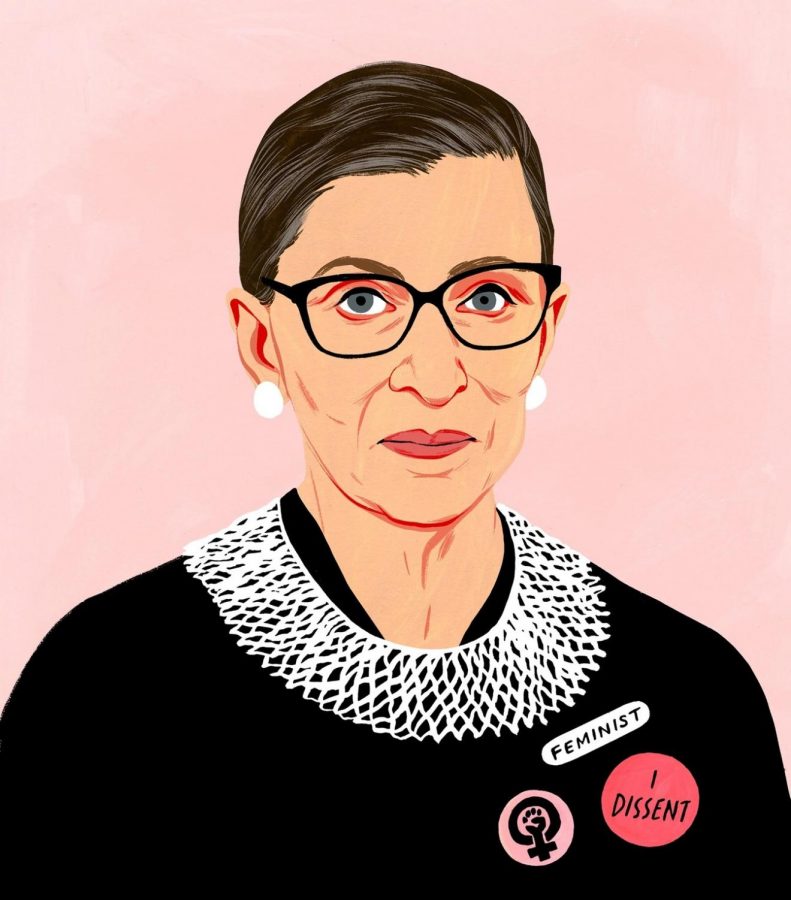The legacy of Ruth Bader Ginsburg

On Sept. 18, Ruth Bader Ginsburg passed away at age 87 due to metastatic pancreatic cancer. She was the 2nd female justice of the Supreme Court of the United States, following Sandra Day O’Connor. The legacy she left behind touched many and will continue to shape change for under-represented members in our society.
Often referred to by her initials, RBG earned her undergraduate degree in government at Cornell University in 1954 where she met her husband Martin Ginsburg. The two continued into graduate school at Harvard University and eventually Ginsburg transferred to Columbia University Law School,where she graduated at the top of her class.
RBG used her professional life to become a servant leader and create positive change for people she may never met. Her commitment was giving a voice to the oppressed, marginalized, or people treated unfairly. She used the interpretation of constitutional law to create change in the United States society championing people who previously did not have representation.
As a Bellarmine community, there is a drive to create servant leaders. Students are encouraged to achieve both academic excellence and to use gifts of opportunity and leadership in volunteer outlets that create positive impacts in Pierce County and other communities Bellarmine touches. Programs such as Shirts Across América and Courts for Kids are two successful programs that do just that.
Ginsburg’s advocacy for fighting against gender discrimination allowed many women to be inducted into roles that were predominantly held by men, like our principal Cindy Davis.
“As the first woman Dean of Students at Bellarmine, I look up to Ruth Bader Ginsburg for the role she played in ensuring women are treated without prejudice,” said Davis.
Many women within the Bellarmine community have a sense of gratitude for Ginsburg’s advocacy for equality. Religion and English teacher Brandy Lindstrom has much appreciation for her. “If it weren’t for the work that she did, I may not have had a chance to play Division 1 soccer,” said Lindstrom.
RBG worked so women had the same educational and athletic opportunities as men. In the case of the United States vs. Virginia, Ginsburg showed that excluding women from public funded educational opportunities was a violation of the 14th amendment of the Constitution. The rights of women have to be protected and she used her knowledge of the Constitution to emphasize those rights.
Not only was Ginsburg a proponent for fighting gender discrimination, she fought against racial inequality. Today at Bellarmine we have a diverse staff and student body. Ginsburg shed light onto marginalized people for their voices to be heard which allows in smaller communities, like our own, for the unrepresented people to be heard. She fought for what was right, often being independent and a leader in her own views as they may not have been popular.
Diversity Director and English teacher Barbara Henderson recounts her mother grew up in New York like Ginsburg and recalls, “my mother always taught me to be independent,” said Henderson. Ginsburg demonstrated that independence whenever she was faced with a case in the court, not changing her ideas or beliefs to fit the majority.
Student differences are also embraced at Bellarmine. Ginsburg was an advocate for the LQBTQ+ community. In 2015, a lawsuit was filed in Ohio against the governor by two men wanting their union recognized. The case allowed for consistent acceptance of marriage licenses in all 50 states for same-sex couples wishing to legally wed. Her being an ally to the LQBTQ+ community offered acceptance and support to the outliers who lacked a voice in society.
Ginsburg challenged the idea that immigrants who are convicted of crimes not be deported after serving their prison sentence. In 2018, a Fillipino immigrant man was convicted of burglary and after serving his sentence and was going to be deported. The Supreme Court challenged Ohio so that he would not be deported because he served his time like any other convicted citizen. Ginsburg advocated to abolish “the residual clause” (which deports non-citizens convicted of crimes after sentences are completed). Her abolishing it, in 2018, allowed fair treatment of immigrants in the US courts like any other United States born citizen. Ginsburg successfully challenged traditional laws that were inherently discriminatory.
Our society has very defined gender roles and historically movement outside of those gender roles was met with lack of support. A major example is where men are meant to support the family by going to work while the woman stays home, cooks, cleans, and raises children. However, the work of Ginsburg shrunk the stigma of crossing gender roles.
“It doesn’t matter who’s doing what, that sex does not matter, that a man that is staying home with a child is providing the same care, love, and support that a women would. Why should he be treated any differently under the law?” said history teacher Robert Payne. Her commitment of redefining gender roles allowed many different situations today to be accepted by society.
She fought for workplace equality challenging the idea that men deserved more compensation than women. In 2007, a female Goodyear (a tire company) employee was getting paid less than her male counterparts after working for the company for 19 years. Unaware of the wage gap for 19 years, she filed a lawsuit against her employer but Goodyear countered because the complaint of discrimination was not filed within 180 days of the occurrence. The Supreme Court ruled in favor of Goodyear. However, Ginsburg continued to advocate for the gender wage gap in this case. Her advocacy resulted in the Lilly Ledbetter Fair Pay Act. This would’ve not happened without RGB. This is a prominent example of how her independence of her own beliefs were not to be altered by the majority.
A woman disagreeing in a male dominant forum was very unheard of during much of Ginsburg’s career. She was not afraid to disagree with the majority on the court. In the 2000 presidential election, Bush wanted a recount of votes while the other judges thought it wasn’t necessary. Ginsburg believed that a recount should happen and showed her courage by dissenting which showed how she wasn’t afraid to stick up for her beliefs. “She is a powerful example of someone who lived her beliefs and wasn’t afraid to voice them or stand alone in defending them,” said Dean of Students Cari Harrison.
Ruth Bader Ginsburg’s legacy will pave the way for equality, acceptance of the LQBTQ+ community, redefining gender roles and the fair treatment of women and other minorities. In our own school, without her work our Bellarmine community would not be the same.

AJ is a senior this year and very pleased to be part of the Journalism staff. She is involved at Bellarmine with the girls soccer program and is a part...
